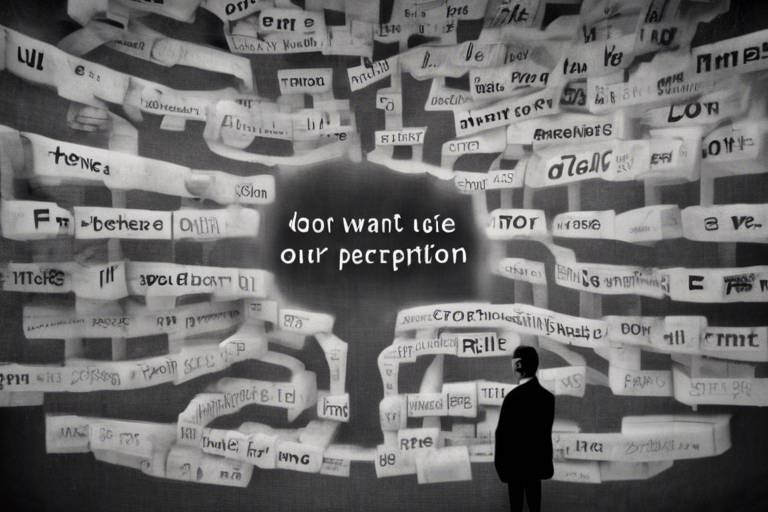The Fundamental Role of Ontology in Philosophy
Ontology, often described as the study of being and existence, serves as a cornerstone in the realm of philosophy. It invites us to ponder profound questions about reality: What does it mean to exist? What is the nature of being? This exploration extends beyond mere academic inquiry; it touches the very fabric of our understanding of the world and our place within it. Ontology shapes our perceptions, influences our beliefs, and underpins various philosophical branches, from metaphysics to epistemology.
At its core, ontology seeks to categorize and understand the different types of entities that populate our universe. It distinguishes between concrete objects, abstract concepts, and even the relationships that bind them. For instance, consider how we interact with a physical chair versus the idea of 'chairness' itself. This distinction is crucial in ontology as it helps clarify what it means to say something 'exists.' By dissecting these layers of existence, ontology lays the groundwork for deeper philosophical discussions.
Moreover, ontology is not static; it evolves as our understanding of the world changes. Think of it as a living organism, adapting and growing in response to new ideas and discoveries. This adaptability has allowed ontology to remain relevant across centuries, influencing various philosophical movements and schools of thought. Whether it’s the existentialists grappling with the meaning of individual existence or the analytic philosophers dissecting language and logic, ontology remains at the heart of these discussions, guiding our quest for understanding.
As we embark on this journey through the landscape of ontology, we will encounter a rich tapestry of historical developments, key thinkers, and transformative ideas that have shaped its evolution. From the ancient musings of pre-Socratic philosophers to the modern debates in analytic philosophy, the significance of ontology in philosophical discourse is undeniable. It serves not only as a foundation for understanding existence but also as a lens through which we can examine the complexities of life itself.
- What is ontology? - Ontology is the branch of philosophy that studies the nature of being, existence, and reality.
- Why is ontology important? - It helps us understand the foundational concepts of existence, influencing various philosophical discussions and beliefs.
- Who are some key figures in ontology? - Important figures include Heraclitus, Parmenides, Thomas Aquinas, Martin Heidegger, and contemporary analytic philosophers.
- How does ontology relate to other branches of philosophy? - Ontology intersects with metaphysics, epistemology, and ethics, providing a framework for understanding broader philosophical issues.

Understanding Ontology
Ontology is a fascinating branch of philosophy that dives deep into the questions of being, existence, and the nature of reality. At its core, ontology seeks to answer profound questions such as: What does it mean to exist? What kinds of things exist? And how do these entities relate to one another? To put it simply, ontology is like the blueprint of reality, outlining the different categories of being and their interconnections.
One of the fundamental principles of ontology is the distinction between different types of entities. Philosophers often categorize entities into two main groups: concrete and abstract entities. Concrete entities are those that have a physical presence, such as trees, animals, and humans, while abstract entities include concepts like numbers, properties, and ideas, which do not occupy physical space but are nonetheless essential for our understanding of the world.
Moreover, ontology also examines the relationships between these entities. For instance, how do we understand the relationship between a chair (a concrete entity) and the concept of furniture (an abstract entity)? This inquiry is crucial because it helps us establish a framework for understanding how different elements of reality interact and depend on one another.
Additionally, ontology is not just a static field; it evolves as our understanding of existence grows. New scientific discoveries and philosophical debates continuously challenge and refine our ontological frameworks. For example, the advent of quantum physics has led to new ontological questions about the nature of particles and their existence, pushing philosophers to rethink traditional categories of being.
In essence, ontology serves as a foundational pillar in the broader landscape of philosophy. It provides the necessary tools to dissect complex ideas about reality and existence, paving the way for other philosophical inquiries. Whether it’s ethics, epistemology, or metaphysics, ontology remains a critical component that informs and enriches our understanding of these fields.

Historical Development of Ontology
The historical development of ontology is a fascinating journey that traces back to the roots of philosophical inquiry. It has evolved significantly over the centuries, shaped by the thoughts and ideas of various influential thinkers. Understanding this evolution not only highlights the importance of ontology in philosophy but also reveals how our understanding of existence has transformed. From the early musings of the Pre-Socratic philosophers to the complex debates of modern thinkers, ontology has been a central theme in the quest for knowledge.
In ancient Greece, philosophers began to grapple with fundamental questions about existence. These early thinkers, often referred to as the Pre-Socratics, laid the groundwork for ontological discourse. They sought to understand the nature of reality and the essence of being, paving the way for future philosophical explorations. Their ideas were not just abstract; they challenged the very way people perceived the world around them. For instance, the Pre-Socratic philosopher Thales proposed that water is the fundamental substance of all things, suggesting that everything has a common origin.
Among the Pre-Socratic thinkers, two prominent figures stand out: Heraclitus and Parmenides. Their contrasting views on existence sparked a pivotal ontological debate that continues to resonate today. Heraclitus famously stated that "everything flows," emphasizing the notion of constant change. He argued that the world is in a perpetual state of flux, and nothing remains the same. This perspective invites us to consider the dynamic nature of existence, where change is the only constant.
Heraclitus' philosophy challenges static notions of being, suggesting that our understanding of existence must accommodate the idea of transformation. Imagine standing by a river; the water you see now is not the same water that flowed a moment ago. This metaphor encapsulates Heraclitus' view: existence is like that river, ever-changing and fluid. His insights compel us to rethink how we define reality, urging us to embrace the complexity and variability inherent in life.
In stark contrast, Parmenides argued for the unity and unchangeability of being. He posited that change is merely an illusion, and true reality is singular and unalterable. Parmenides' radical ideas forced philosophers to confront the implications of a static existence. His assertion that "what is, is" leads to profound questions about the nature of reality. Are we to accept that change is illusory, or can we reconcile the two perspectives? This ontological tension between Heraclitus and Parmenides set the stage for centuries of philosophical debate.
As philosophy progressed into the medieval period, ontology began to intertwine with theology. Thinkers like Thomas Aquinas sought to integrate ontological concepts with religious beliefs, providing a framework that combined faith and reason. Aquinas' work emphasized the existence of God as the ultimate being, infusing ontology with spiritual significance. He argued that understanding the nature of being was essential to comprehending divine existence.
The medieval era also saw the emergence of scholasticism, where philosophers engaged in rigorous debates about the nature of existence, often referencing ancient texts. This period was marked by a quest to reconcile faith with philosophical inquiry, leading to a rich tapestry of ontological thought that influenced later philosophers during the Renaissance and beyond.
In conclusion, the historical development of ontology reflects a rich and varied intellectual tradition. From the early explorations of the Pre-Socratic philosophers to the intricate discussions of the medieval period, ontology has continuously evolved. Each thinker contributed their unique perspectives, shaping our understanding of existence and laying the groundwork for modern philosophical discourse.
- What is ontology? Ontology is the philosophical study of being and existence, examining the nature of reality and the relationships between different entities.
- Who were the key figures in the development of ontology? Key figures include Pre-Socratic philosophers like Heraclitus and Parmenides, as well as medieval thinkers like Thomas Aquinas.
- How has ontology influenced modern philosophy? Ontology has shaped discussions in various branches of modern philosophy, including existentialism and analytic philosophy, by addressing fundamental questions about existence and reality.

Pre-Socratic Philosophers
The represent a pivotal era in the history of philosophy, laying the groundwork for ontological inquiry. These thinkers, active before Socrates, ventured into the fundamental questions of existence and the nature of reality. They were not just concerned with the world around them; they sought to understand the very essence of being itself. Imagine standing at the edge of a vast ocean of thought, where each wave represents a different idea about existence. This is the landscape that the Pre-Socratics navigated.
Among these early philosophers, figures like Thales, Anaximander, and Heraclitus emerged, each contributing unique perspectives that would echo throughout the ages. Thales, often considered the first philosopher, proposed that water is the fundamental substance of all things. This idea suggests a unity beneath the diversity of existence, a theme that would resonate with later ontological debates. Anaximander, a student of Thales, took this further by introducing the concept of the apeiron or the 'infinite.' He posited that this boundless substance is the origin of all things, challenging the notion of a singular defining element and hinting at a more complex understanding of being.
Then there's Heraclitus, who famously declared that "you cannot step into the same river twice." His assertion that change is the fundamental essence of reality contrasts sharply with the static views of his predecessors. For Heraclitus, existence is a dynamic process, constantly in flux, which raises profound ontological questions: If everything is in a state of change, what does it mean to 'be'? This inquiry into the nature of change and permanence would set the stage for future philosophers to grapple with the implications of existence.
On the other hand, Parmenides presented a starkly different perspective. He argued that change is an illusion and that reality is unchangeable and eternal. Parmenides contended that "what is, is" and "what is not, is not," leading to a radical conclusion about the nature of being. His ideas force us to confront the paradox of existence: if change is an illusion, how do we reconcile our experiences of a world that seems so fluid? This tension between Heraclitus and Parmenides illustrates the rich tapestry of thought that the Pre-Socratic philosophers wove, each thread contributing to our understanding of ontology.
In summary, the Pre-Socratic philosophers were not merely thinkers; they were pioneers in the quest to unravel the mysteries of existence. Their explorations into the nature of being, change, and the fundamental substances of reality laid the groundwork for centuries of philosophical inquiry. As we delve deeper into the history of ontology, it's essential to recognize the profound impact these early philosophers had on shaping the questions that continue to resonate in philosophical discourse today.
- Who were the Pre-Socratic philosophers? The Pre-Socratic philosophers were early Greek thinkers who explored fundamental questions about existence and reality before the time of Socrates.
- What were the main contributions of Pre-Socratic philosophers to ontology? They introduced key concepts such as the nature of being, the idea of change versus permanence, and the search for a fundamental substance that constitutes reality.
- How did Heraclitus and Parmenides differ in their views on existence? Heraclitus believed that change is the essence of existence, while Parmenides argued that reality is unchangeable and eternal.

Heraclitus and Change
Heraclitus, a pre-Socratic philosopher from Ephesus, is often celebrated for his profound insights into the nature of change. He famously asserted that "you cannot step into the same river twice," encapsulating the essence of his philosophy: everything is in a state of flux. This perspective challenges the conventional notion of stability and invites us to reconsider our understanding of existence. To Heraclitus, change is not merely an external phenomenon but an intrinsic aspect of being itself. He believed that the universe is characterized by a constant struggle between opposites, which he referred to as the "unity of opposites." This concept suggests that contradictions are essential for the harmony and balance of the cosmos.
Heraclitus's emphasis on change can be likened to the flow of a river. Just as the water continuously moves and reshapes the landscape, so too does existence evolve and transform. This analogy highlights how our experiences and perceptions are never static; they are always influenced by the passage of time and the interplay of various forces. In fact, Heraclitus argued that without change, there would be no life at all. He stated, "Strife is justice," suggesting that conflict and change are not only natural but necessary for the progression of life.
Moreover, Heraclitus introduced the idea of the Logos, a rational principle that governs the cosmos. The Logos represents the underlying order and reason amidst the chaos of change. It implies that while everything is in flux, there is a coherent structure that guides this transformation. This duality of chaos and order is a recurring theme in philosophy and continues to resonate in contemporary discussions about existence and reality.
To summarize Heraclitus's contributions, we can highlight a few key points:
- Change is constant: Everything is in a perpetual state of flux.
- Unity of opposites: Contradictions are essential for harmony.
- Logos: There is an underlying rational principle that governs change.
Heraclitus's ideas laid the groundwork for later philosophical inquiries into the nature of reality and existence. His thoughts on change have influenced various philosophical movements, prompting thinkers to explore the implications of a world in constant motion. As we delve deeper into the realm of ontology, understanding Heraclitus's perspective becomes crucial in grappling with the complexities of being and existence.

Parmenides and Being
Parmenides, a towering figure in the realm of ancient philosophy, made a profound impact on our understanding of existence. His central thesis revolved around the idea of being as a singular, unchanging reality. Unlike his contemporaries who were captivated by the sensory world and its apparent changes, Parmenides boldly asserted that change is an illusion. He argued that if something can be said to exist, it must be eternal and unalterable, leading to the radical conclusion that what is, is, and what is not, is not.
To grasp Parmenides' perspective, one must appreciate the stark contrast he presents against the backdrop of his predecessors, particularly Heraclitus, who famously stated that "you cannot step into the same river twice." For Parmenides, this notion of flux was not only misleading but fundamentally flawed. He proposed that reality is a cohesive whole, devoid of division or multiplicity. In his poem, often referred to as "On Nature," he delineates a path of inquiry that leads to the recognition of being as the only true essence, dismissing the deceptive nature of sensory experience.
Parmenides' ideas can be encapsulated in a few key points:
- Unity of Being: Parmenides posited that being is one and indivisible. There cannot be a plurality of beings; otherwise, they would contradict the very nature of existence.
- Immutability: He maintained that being is unchanging. Any perception of change is merely an illusion, distracting us from the true nature of reality.
- Rational Inquiry: Parmenides emphasized the importance of reason over sensory perception. He believed that understanding being requires a rational approach rather than reliance on the senses, which can deceive.
The implications of Parmenides' philosophy extend far beyond his time. His radical ideas laid the groundwork for subsequent philosophical discourse, influencing not only Plato and Aristotle but also modern metaphysics. By challenging the prevailing notions of change and plurality, Parmenides invited future thinkers to reconsider the very foundations of existence. His arguments provoke essential questions: If being is unchanging, how do we account for the apparent diversity in the world? And how does this understanding shape our perception of reality?
In conclusion, Parmenides' exploration of being serves as a cornerstone in the study of ontology. His insistence on the unity and immutability of existence invites us to engage in a deeper examination of what it means to be. As we navigate the complexities of modern philosophy, the echoes of Parmenides' thought remind us of the enduring quest for truth and understanding in an ever-changing world.
- What is Parmenides known for? Parmenides is known for his argument that being is unchanging and indivisible, challenging the notion of change that was prevalent in ancient philosophy.
- How did Parmenides influence later philosophers? His ideas about the nature of being significantly influenced Plato, Aristotle, and later metaphysical discussions, prompting deeper inquiries into existence and reality.
- What is the significance of Parmenides' poem "On Nature"? The poem outlines his philosophical arguments regarding being and serves as a crucial text in understanding early ontological thought.

Medieval Ontology
The medieval period marked a significant turning point in the development of ontology, where philosophical inquiry began to intertwine deeply with theological considerations. During this era, thinkers sought to reconcile the ancient philosophical traditions with the emerging Christian doctrine, leading to a rich tapestry of ideas that shaped the understanding of existence and being. One of the most influential figures in this period was Thomas Aquinas, who masterfully integrated Aristotelian philosophy with Christian theology. His work emphasized the importance of substance and essence, positing that everything in existence has a fundamental nature that defines its being.
Aquinas distinguished between two types of being: actuality and potentiality. Actuality refers to what is, while potentiality pertains to what could be. This distinction is crucial because it allows for a deeper understanding of change and existence. For instance, consider a seed: it has the potential to become a tree, but until it grows, it remains just a seed. This analogy illustrates how ontology during the medieval period began to grapple with the complexities of existence, moving beyond mere categorization to explore the very nature of being itself.
Another key contributor to medieval ontology was Augustine of Hippo, who introduced the idea of divine illumination. Augustine argued that true knowledge comes from God and that human understanding is limited unless illuminated by divine grace. This perspective added a spiritual dimension to ontological discussions, suggesting that our grasp of existence is inherently tied to a higher power. Such ideas led to the belief that the essence of beings could not be fully understood without considering their relationship to the divine.
Moreover, the medieval philosophers engaged in rigorous debates about the nature of universals—concepts that represent general qualities shared by particular entities. This question revolved around whether universals exist independently of the objects they describe (realism) or whether they are merely names we use to categorize our experiences (nominalism). The tension between these positions fueled much of the ontological discourse of the time, as scholars sought to understand the implications of their views on existence and reality.
To summarize, medieval ontology was characterized by:
- The integration of philosophy and theology, particularly through the works of Aquinas and Augustine.
- The exploration of substance and essence, leading to a deeper understanding of existence.
- The debate over the nature of universals, which significantly influenced later philosophical developments.
In conclusion, the medieval period was a rich era for ontological exploration, laying the groundwork for future philosophical inquiry. The interplay between faith and reason during this time not only shaped the landscape of ontology but also influenced many branches of philosophy that followed, ensuring that the questions of being and existence would remain central to philosophical discourse.
- What is ontology? Ontology is the philosophical study of being and existence, exploring the nature of reality and the relationships between entities.
- How did medieval philosophy influence modern thought? Medieval philosophy, particularly through figures like Aquinas, integrated theological concepts with philosophical inquiry, setting the stage for modern existential and analytic philosophies.
- What are the main concerns of medieval ontology? Key concerns included the nature of substance, the relationship between universals and particulars, and the intersection of faith and reason.

Ontology in Modern Philosophy
In the realm of modern philosophy, ontology has taken on a new life, evolving beyond its classical roots to address contemporary issues such as language, perception, and the nature of reality itself. One might wonder, how did we transition from ancient musings about "being" to the intricate discussions we have today? The answer lies in the profound impact of various philosophical movements that have reshaped our understanding of existence.
Modern ontology is often characterized by its engagement with the complexities of human experience. Thinkers like Immanuel Kant shifted the focus from mere existence to how we perceive and understand that existence. Kant argued that our knowledge is shaped by the structures of our mind, essentially claiming that we can never know things as they are in themselves, but only as they appear to us. This pivotal idea opened the door for subsequent philosophers to explore the relationship between language, thought, and reality.
One significant movement in modern philosophy is Existentialism, which emphasizes individual existence and freedom. Existentialist philosophers such as Martin Heidegger and Jean-Paul Sartre delve deep into the nature of being, arguing that existence precedes essence. This means that individuals are not defined by predetermined categories or labels; instead, they create their own essence through choices and actions. For these thinkers, ontology is not merely an abstract inquiry but a practical concern that speaks to the very fabric of human life.
Heidegger, in particular, redefined ontology by introducing the concept of Dasein, which refers to the experience of being that is uniquely human. He argued that understanding our own existence is crucial for grasping the broader questions of being. In his view, we are constantly thrown into a world filled with possibilities, and our task is to navigate through these possibilities while being aware of our own mortality. This perspective adds a layer of urgency to ontological questions, making them deeply personal and existential.
On the other hand, Analytic Philosophy has approached ontology with a more rigorous lens, emphasizing clarity, logic, and language. Philosophers like Bertrand Russell and W.V.O. Quine have sought to clarify ontological commitments by examining the language we use. Quine famously challenged the distinction between analytic and synthetic truths, arguing that our understanding of existence is inseparable from the language we employ. This has led to debates about the nature of existence itself: what does it mean to say something exists? Is existence a property, or is it merely a linguistic convention?
In contemporary discussions, ontology is increasingly intertwined with issues in science and technology. For instance, the rise of artificial intelligence and virtual realities has sparked new ontological inquiries. Questions arise such as: Do virtual entities have existence? How do we define reality in a world where digital and physical experiences blur? These questions highlight the ongoing relevance of ontology in addressing modern challenges, making it a vibrant field of philosophical inquiry.
Ultimately, the evolution of ontology in modern philosophy showcases a dynamic interplay between various schools of thought, each contributing to a richer understanding of existence. As we grapple with the complexities of our own lives and the world around us, the insights from ontology provide valuable frameworks for navigating the philosophical landscape. Whether through existential reflections or analytical precision, ontology remains a cornerstone of philosophical discourse, continually inviting us to question the very nature of being.
- What is the main focus of ontology in modern philosophy? Modern ontology focuses on understanding existence through the lenses of language, perception, and human experience.
- How do existentialists view ontology? Existentialists emphasize individual existence and freedom, arguing that individuals define their essence through choices and actions.
- What role does language play in contemporary ontological discussions? Language shapes our understanding of existence, and philosophers analyze how linguistic structures influence our ontological commitments.
- How has technology influenced modern ontology? Advances in technology, such as artificial intelligence and virtual realities, have raised new ontological questions about the nature of existence.

Existentialism and Ontology
Existentialism, a philosophical movement that emerged in the 20th century, profoundly intertwines with ontology, the study of being. At its core, existentialism emphasizes the importance of individual existence, freedom, and choice. Think about it: when you wake up in the morning, you face a world filled with possibilities, yet it’s your choices that define your reality. This notion resonates deeply with existentialist thinkers like Martin Heidegger and Jean-Paul Sartre, who explored how our understanding of being is shaped by our lived experiences.
Heidegger, in his seminal work Being and Time, posits that to understand being, we must first acknowledge our own existence. He introduces the concept of Dasein, which translates to "being-there." Dasein emphasizes the idea that human beings are not just passive observers of the world; we actively engage with it, shaping our own essence through our actions and decisions. This perspective challenges traditional ontological views that often treat being as a static entity, instead portraying it as dynamic and evolving.
Sartre takes this further by asserting that "existence precedes essence." This radical declaration implies that we are not born with a predetermined purpose; rather, we create our essence through our choices. In this sense, ontology becomes a canvas upon which we paint our identities, driven by our desires and aspirations. Sartre’s notion of freedom is both exhilarating and daunting—every choice carries weight, and with it comes the responsibility to forge our own paths.
Moreover, existentialism invites us to confront the absurdity of existence. The world can often seem chaotic and devoid of inherent meaning, a theme prevalent in the works of existentialist philosophers. In grappling with this absurdity, individuals are encouraged to embrace their freedom and create meaning in their lives. This existential struggle is not just a philosophical concept; it’s a deeply personal journey that resonates with anyone who has ever questioned their place in the universe.
To illustrate the relationship between existentialism and ontology, let’s consider a table that summarizes key ideas:
| Philosopher | Key Concept | Implications for Ontology |
|---|---|---|
| Martin Heidegger | Dasein (Being-there) | Being is dynamic and shaped by human experience. |
| Jean-Paul Sartre | Existence precedes essence | Humans create their essence through choices. |
| Albert Camus | The Absurd | Confronting absurdity leads to personal freedom. |
In conclusion, existentialism profoundly enriches our understanding of ontology by emphasizing the role of individual experience and choice in the construction of reality. It challenges us to reflect on our existence and the meanings we ascribe to it. In a world that often feels chaotic, existentialist thought encourages us to embrace our freedom and take ownership of our lives, reminding us that we are the authors of our own stories.
- What is the main focus of existentialism? Existentialism primarily focuses on individual existence, freedom, and the search for meaning in a seemingly indifferent universe.
- How does ontology relate to existentialism? Ontology, the study of being, is central to existentialism as it examines how our existence and choices shape our understanding of reality.
- Who are the key figures in existentialist philosophy? Major figures include Martin Heidegger, Jean-Paul Sartre, and Albert Camus, each contributing unique perspectives on existence and meaning.

Analytic Philosophy and Ontology
Analytic philosophy has significantly reshaped the landscape of ontology by introducing a meticulous approach that emphasizes clarity, precision, and logical rigor. Unlike traditional metaphysical inquiries that often delve into abstract concepts without clear definitions, analytic philosophers prioritize the analysis of language and the structures of thought. This focus leads to a more nuanced understanding of what it means to exist, challenging us to reconsider our assumptions about reality.
One of the central tenets of analytic philosophy is the idea that many ontological questions can be resolved or at least clarified through careful examination of the language we use. For instance, when we talk about entities such as "numbers," "properties," or "possible worlds," analytic philosophers urge us to ask: What do we mean by these terms? Are they merely linguistic constructs, or do they represent something more tangible in the world?
To illustrate this point, consider the following key contributions from prominent analytic philosophers:
- Bertrand Russell: He introduced the concept of logical atomism, suggesting that the world consists of a set of discrete, independent facts. Russell's work prompts us to inquire about the fundamental components of reality and how they relate to one another.
- W.V.O. Quine: Quine famously challenged the distinction between analytic and synthetic truths, asserting that our understanding of existence is intertwined with our empirical observations. His holistic approach suggests that our ontological commitments are shaped by our entire web of beliefs.
- Saul Kripke: Known for his work on naming and necessity, Kripke's ideas about rigid designators have implications for how we think about identity and existence. He argues that some entities can be identified in ways that transcend our linguistic frameworks, pushing the boundaries of ontological discussions.
These thinkers, among others, have paved the way for contemporary debates in analytic ontology. They compel us to confront fundamental questions such as: What kinds of things exist? Do abstract entities like numbers have the same ontological status as physical objects? Furthermore, how does our understanding of language shape our conception of reality?
In modern analytic philosophy, ontological discussions often intersect with other fields, such as epistemology and philosophy of language. For instance, when we analyze the nature of existence, we must also consider how we come to know about these entities and the linguistic tools we use to describe them. This interplay creates a rich tapestry of inquiry that continues to evolve, challenging philosophers to refine their arguments and explore new avenues of thought.
As the dialogue around ontology progresses, it becomes increasingly clear that the questions we ask and the frameworks we use can significantly impact our understanding of existence. Analytic philosophers encourage us to remain vigilant about our assumptions and to engage critically with the language we employ. By doing so, we not only deepen our grasp of ontology but also enhance our overall philosophical inquiry.
- What is the main focus of analytic philosophy? Analytic philosophy emphasizes clarity and logical rigor, often analyzing language to clarify philosophical problems.
- How does analytic philosophy approach ontology? It examines the meaning of terms related to existence and analyzes how language influences our understanding of reality.
- Who are some key figures in analytic philosophy? Notable figures include Bertrand Russell, W.V.O. Quine, and Saul Kripke, each contributing unique perspectives to the field.
- What role does language play in ontological discussions? Language shapes our ontological commitments, influencing how we categorize and understand different entities in the world.
Frequently Asked Questions
- What is ontology in philosophy?
Ontology is the branch of philosophy that studies the nature of being, existence, and reality. It seeks to answer fundamental questions about what entities exist and how they can be categorized and related within a framework of understanding. Think of it as the philosophical toolkit that helps us dissect the very fabric of what it means to exist.
- How did ontology evolve throughout history?
Ontology has a rich history that stretches back to ancient Greece. Early philosophers like the Pre-Socratics laid the groundwork by questioning the nature of existence. Over time, thinkers such as Plato and Aristotle contributed significantly to ontological discussions, which later intertwined with theology during the medieval period, especially through the works of philosophers like Aquinas.
- What role did Pre-Socratic philosophers play in ontology?
Pre-Socratic philosophers were crucial in shaping the early discussions of ontology. They explored fundamental questions about existence and the nature of reality, often focusing on the underlying principles of the cosmos. Their inquiries set the stage for later philosophical developments, prompting deeper explorations into the essence of being.
- How do Heraclitus and Parmenides differ in their views on being?
Heraclitus believed in the idea of constant change, famously asserting that "you cannot step into the same river twice." He emphasized the fluidity of existence. In contrast, Parmenides argued for the unity and unchangeability of being, positing that change is an illusion. Their opposing views sparked significant ontological debates that continue to influence philosophy today.
- What is the connection between ontology and theology in medieval philosophy?
During the medieval period, ontology became deeply intertwined with theological concepts. Philosophers like Aquinas integrated ontological discussions with religious beliefs, arguing about the nature of God and existence. This fusion enriched both fields, leading to a more comprehensive understanding of being that encompassed both philosophical and spiritual dimensions.
- How has modern philosophy redefined ontology?
Modern philosophy has approached ontology with fresh perspectives, particularly by examining the roles of language and perception. Thinkers have engaged with existentialist ideas, emphasizing individual existence and freedom, while analytic philosophers have applied rigorous logical analysis to ontological questions, reshaping how we understand existence in contemporary discourse.
- What is the significance of existentialism in ontology?
Existentialism places a strong focus on individual existence, freedom, and choice. Philosophers like Heidegger and Sartre have shown how ontology is crucial to understanding human existence, emphasizing that our being is defined by our actions and choices rather than predetermined essence. It’s like saying that we are the authors of our own existence, crafting our identity through our experiences.
- How do analytic philosophers approach ontological questions?
Analytic philosophers tackle ontological questions through a lens of language and logic. They focus on clarifying concepts and using precise arguments to address what exists and the nature of those entities. This approach has led to a more structured discussion of ontology, making it accessible and relevant to various fields, including science and linguistics.



















